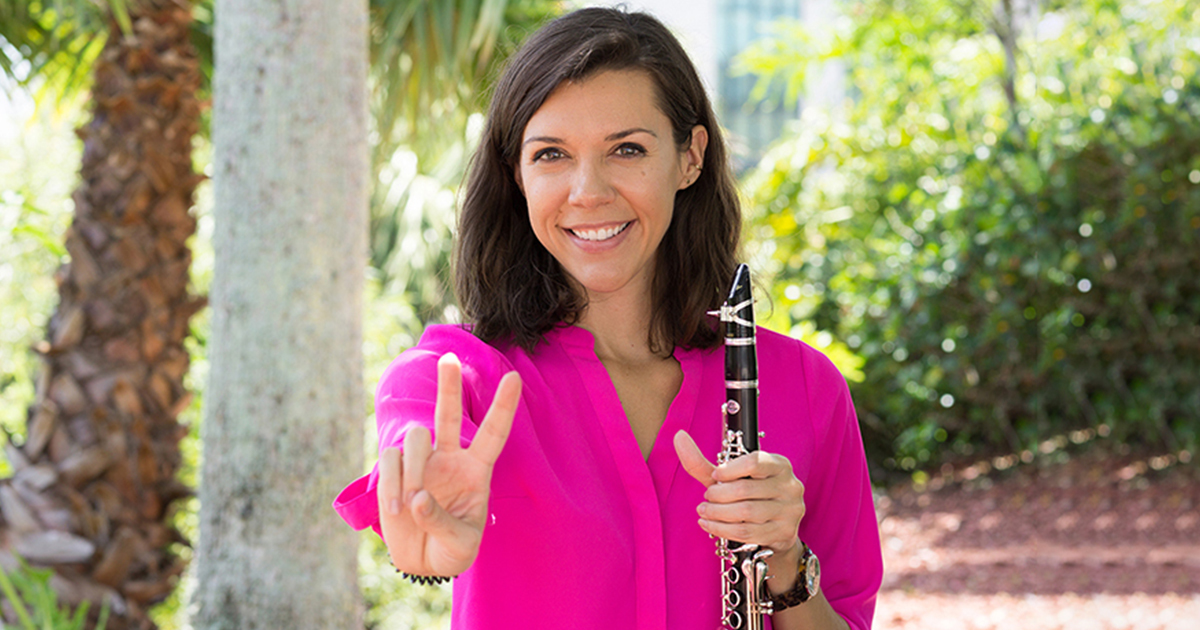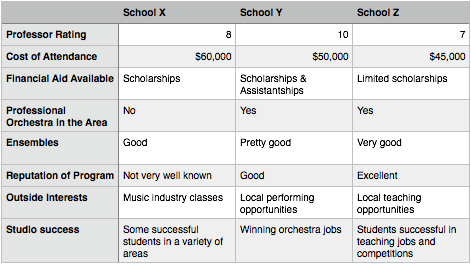Preparing for College Auditions
by Dr. Jackie Glazier
Date Posted: October 05, 2017

Dr. Jackie Glazier is a Vandoren Artist-Clinician. The goal for the Vandoren Artist-Clinician program is to enhance the quality of the music experience through education and the assistance of Vandoren. These highly trained professional educators and performers will engage your students through educational and fun sessions. The clinics they conduct cover a broad spectrum of topics and, based on your input, can be customized to fit the needs of your students. Contact us today to arrange your free Vandoren clinic.
Preparing for college auditions can be an intimidating process. With the overwhelming amount of schools and options, it can be difficult to know where to begin. Where you choose to attend school is a big decision: in most cases it requires a move, 2 to 4 years at an institution, and weekly study with a teacher who is primarily responsible for your musical development. It’s important to find a place where you feel like you are a good fit and are able to get what you want out of your education. Here are some tips from my personal experience as both a student and a professor:
Decide What Your Career Goals Are
This is the first step in the process. If you are unsure of what direction you want to take your career, it will be difficult for you to select schools that will help you achieve your goals. Do you want to be an orchestral musician? Do you want to play in a military band? Do you want to be a teacher? Do you want to start a festival or ensemble? Are you interested in the recording business? Do you also like to compose? Take inventory of your skills and talents, and try to find a couple of areas where you want to specialize. With the limited number of jobs in the music industry, it is ESSENTIAL to have more than one area that you excel at and can market yourself in. If you focus only on one goal, say playing in an orchestra, you severely limit your options. But if you are also interested in recording, for example, you can look at developing that as a side business. Many 21st-century musicians put together several different jobs to make one career. Try to find multiple avenues you can develop. Double majors and minors in other fields are also a great option.
Do Your Research
Once you know what you want to focus on, you can start to research schools and teachers that align with your specific career goals. For instance, if you want to get a job as an orchestral player, it would make sense to try and study with an orchestral clarinetist. If you want to be a teacher, look for a professor with a background in pedagogy. Most importantly, look and see where students from each school are getting jobs.
Many programs have great websites with a wealth of information. Spend lots of time here. Don’t reach out to people at the school with questions that can be answered by looking at the website. Word of mouth is also important. Talk to students from the schools you are looking at, and ask them questions. Most people are more than willing to help, even if they don’t know you well. Current and previous students will have the best information about a school or teacher.
Although the teacher is probably the most important consideration, there are many other factors to consider. School and studio size will effect the amount of playing time in top ensembles, solo and chamber music opportunities, and in some cases what teacher you are able to study with. It can be overwhelming for an 18 year-old undergrad to be in a studio with 10 doctoral students, and you may never get to play in the top ensembles at that school during your four years there. On the flip side, you want to make sure that you are in a place with studio members who will challenge you. Every size studio has its pros and cons, and it really depends on what you are looking for and what the school can offer you.
Some questions to ask are: What opportunities are there for you to grow as a soloist and chamber musician? Does the school support its students and alumni? Do they support opportunities for travel? Are there plenty of opportunities for you to hear professional recitals and work with guest artists? Are there opportunities for you to expand musically into the community? Does the school offer other programs you might be interested in, such as arts administration, a recording studio, or instrument repair? All of these are things to consider.
Consider the Finances
This is an extremely important and often neglected area of college audition planning. Look at the cost of attendance, cost of living, and available scholarships and assistantships for each school. Some schools have great assistantship programs for graduate students that will cover the cost of tuition in addition to providing a monthly stipend. When you are weighing a possible assistantship versus, say $60,000 in debt, this makes a huge difference. One of my close friends recently decided not to attend a very prestigious grad school, because even after she was awarded a scholarship, she realized she would be paying off loans until she was 45. Taking on this type of debt is a major decision and should be carefully considered.
If you are a high school student, don’t neglect your grades and test scores. Many institutions will provide significant scholarships based on academics, which can greatly help towards getting your education funded!
Weigh the Pros and Cons
As you are accumulating information, it is a great idea to gather all your research and put it into a spreadsheet or document so you can process everything. I know many students who picked schools to audition for without really considering all the options. At the end of the audition process they were left deciding between schools that they would never actually attend. Auditioning is expensive! Don’t waste your time and money applying to schools you would never actually consider.
Here is a sample chart to help you weigh your options:

Plan a Visit
Once you have narrowed down a list of possible schools, it is essential that you make visits to have lessons with the professor. This benefits you in a number of ways. Most importantly, it allows you an opportunity to learn from the professor and see how you connect. I cannot stress how vital it is for you to have this opportunity. Teacher / student chemistry is extremely important and depends on the specific people involved. Just because your best friend loves this teacher does not mean you will connect with him or her in the same way. The trial lesson also allows the teacher to see not only how you play, but how well you learn. I personally will often accept students who aren’t the strongest players at the audition, but who show the most potential. These students have a great work ethic and learn quickly, and I know that they can be successful.
Another benefit of the lesson is that it gives you more contact with the professor. He or she is more likely to remember you when they are making scholarship decisions. If you show up early, present yourself well and are respectful, the teacher will remember these things. It also gives you a second chance. If you don’t play well in your audition, at least the teacher knows what you are capable of.
Lastly, a visit gives you the opportunity to meet the studio and observe the environment. Talk to other members of the studio and ask questions to determine whether this program is the right “fit” for you. If it’s too expensive to make a separate trip to the school, you can always try to set up a lesson when you come to audition.
I am always impressed when students take the initiative to set up a trial lesson. These are almost always the most serious and hard-working students.
Practice and Audition
This part you know how to do. Select your repertoire well in advance and start learning. Play mock auditions for lots of people. If you have to send in prescreen recordings, make sure the recording quality is excellent. Make sure you always present yourself professionally. Dress up for your auditions and speak in a friendly and professional manner. Do not bombard the professor with a million emails! Lastly, make sure all correspondence is brief, well-written and respectful.
GOOD LUCK!
Vandoren Artist-Clinicians
The goal for the Vandoren Artist-Clinician program is to enhance the quality of the music experience through education and the assistance of Vandoren. These highly trained professional educators and performers will engage your students through educational and fun sessions.
View MoreSubscribe to the We Are Vandoren E-newsletter (WAVE) to receive 4 weekly articles for Performers, Students, and Educators